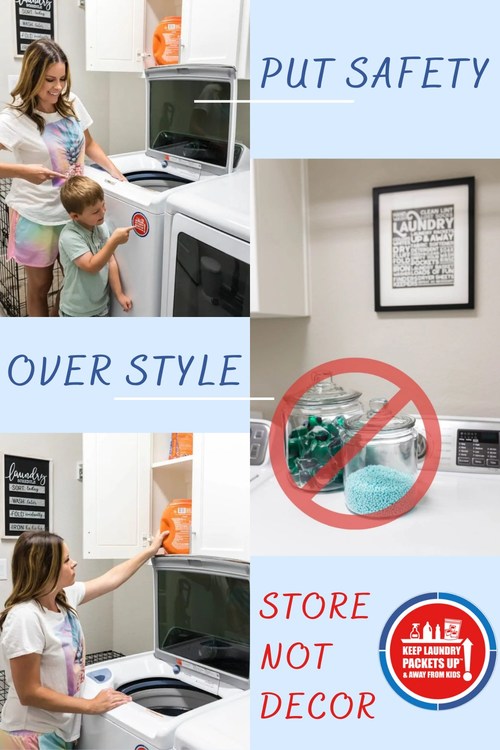#CleanPeachy American Cleaning Institute Urges Social Media Platforms to Take a Stand Against Unsafe Home Organization Visuals
The American Cleaning Institute (ACI) is urging popular social media platforms to help combat the spread of unsafe cleaning product storage trends that can put families at risk. ACI's initial appeal is to Pinterest due to the large number of potentially hazardous laundry room home organization visuals that are on the platform.
Creating safe laundry rooms
Home organization has skyrocketed in popularity since the pandemic, as many Americans transformed their homes from a place to sleep and eat to a gym, school, community center or office. Social media platforms, like Pinterest and Instagram, made home organization accessible and provided examples of how to make it aesthetically pleasing in addition to functional. One common trend sweeping the organization space, storing liquid laundry packets and other cleaning products in glass or clear plastic containers, may look nice, but it creates a serious safety hazard for young children and older adults with cognitive disorders.
A recent ACI survey found 30% of Americans reported seeing social media posts where cleaning products or liquid laundry packets were stored outside of their original packaging (e.g., in clear or glass jars for decoration). Of those who have seen these types of posts on social media, 68% said they have tried or considered trying a new storage idea for cleaning products that they saw online.
To combat unsafe storage practices, ACI launched a series of Pinterest Ads emphasizing the importance of safe storage, calling out the dangerous trend, and pointing social media users back to helpful storage tips and resources.
In addition, ACI and its member companies penned a letter to the Pinterest Executive Committee alerting them to the trend and flagging Pinterest's role in promoting safety and curbing the spread of dangerous practices.
"Laundry detergent packets and all cleaning products should always be kept in their original containers and stored out of sight and reach of children," said Brian Sansoni, ACI Senior Vice President, Communications and Outreach. "As part of our Packets Up mission to raise awareness of safe liquid laundry packets storage, we are bringing this issue to the attention of Pinterest to hopefully get their support in promoting safety over style."
As an extension of ACI's Packets Up campaign, the Store Not Décor challenge raises awareness of this unsafe storage trend and educates on the importance of proper storage of liquid laundry packets and other cleaning products. ACI leverages a variety of parenting, home organizers, and health and science-based influencers to educate and engage with consumers on safe storage messages across Facebook, Instagram, TikTok, Twitter and Pinterest.
For more information and to learn more about ACI's work promoting safe storage, visit PacketsUp.com. The newly refreshed website features educational resources and highlights partner collaborations offering tips for creating a safe and functional laundry space.
The American Cleaning Institute® (ACI – www.cleaninginstitute.org) is the Home of the U.S. Cleaning Products Industry® and represents the $60 billion U.S. cleaning product supply chain. ACI members include the manufacturers and formulators of soaps, detergents, and general cleaning products used in household, commercial, industrial and institutional settings; companies that supply ingredients and finished packaging for these products; and chemical distributors. ACI serves the growth and innovation of the U.S. cleaning products industry by advancing the health and quality of life of people and protecting our planet. ACI achieves this through a continuous commitment to sound science and being a credible voice for the cleaning products industry.
These findings emerged from an Ipsos poll conducted February 16 – 17, 2022, on behalf of the American Cleaning Institute. For the survey, a sample of 1,005 adults ages 18 and over from the continental U.S., Alaska and Hawaii was interviewed online in English. The precision of Ipsos online polls is measured using a credibility interval. In this case, the poll has a credibility interval of plus or minus 3.8 percentage points for all respondents.
































































































